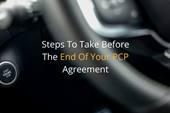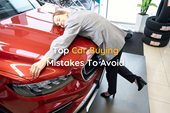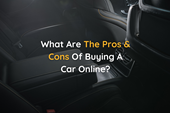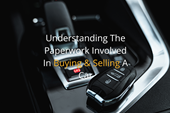
Questions to Ask When Visiting a Car Dealership
Make The Most Of Your Next Car Dealership Visit With These ‘Must Ask’ Questions.
Quick Links
- Introduction
- Why Buy A Car From A Dealership
- Questions To Ask When Visiting A Car Dealership
- What Is The Total Price Of This Car?
- Are There Any Additional Fees Or Add-Ons I Should Know About?
- Has This Car Ever Been Used As A Demo Or Loan Vehicle?
- Can I See The Service History And MOT Details?
- What Warranty Is Included And What Does It Cover?
- What's The Real Interest Rate On This Finance Deal?
- What's The Mileage Allowance If I Choose PCP Or Lease?
- Can I Take It For A Proper Test Drive?
- Is There Room For Negotiation?
- What Happens If I Change My Mind?
- Can I Take A Look At The Paperwork Before Signing?
- Our Final Word
Introduction
Walking into a car dealership can be overwhelming for some. You’re expected to know your budget, understand your needs, and somehow hold your own in a conversation with someone who sells cars all day, every day.
These days, dealerships are pretty open and honest (long gone are the days of dodgy sales tactics and ‘today only’ deals). In fact, any good salesperson should help you find the right car for you, so you can walk away happy (and, hopefully, keep coming back for years to come).
That said, it’s easy to get swept up in the smell of new leather and shiny alloys and lose sight of the real reason you’re there: getting a good deal and finding the perfect car for you. That’s where asking the right questions comes in.
In this article, we’re giving you a few pointers and things to ask when you visit a car dealership, so you can stay calm and get it right. First though, let’s take a look at some of the dealership basics.
Why Buy From A Car Dealership?
Despite the rising popularity of online car buying, with 3 in 10 consumers planning to buy their next car entirely online, there’s still a place for the familiarity, sense of security and ‘hand-holding’ that comes with buying through a dealership.
Buying through a dealership offers the sense of stability that doesn’t come with independent, ‘back street’ or private sellers, which could take your money one day and be gone the next. Online selling, whilst a little more predictable isn’t without danger, as some platforms such as Cazoo have shown.
A dealership also offers that step by step process and expert-lead approach that can help buyers that aren’t sure where to start. Even with the plethora of helpful car buying content online (including ours; The Only Car Buying Guide You’ll Ever Need), it’s still worth taking at least a hybrid approach, doing your initial research online, then working with a dealership to make sure you get the final stages of the purchasing process absolutely right.
A good, transparent and honest dealership can be worth their weight in gold when it comes to pairing you with the perfect car. Something which can miss the mark elsewhere.
Are Car Dealerships Still Popular?
Yes. Whilst online car buying has grown, dealerships are still king when it comes to the car buying process. In fact, 76% of all car buyers still consider the dealership visit an important part of car buying.
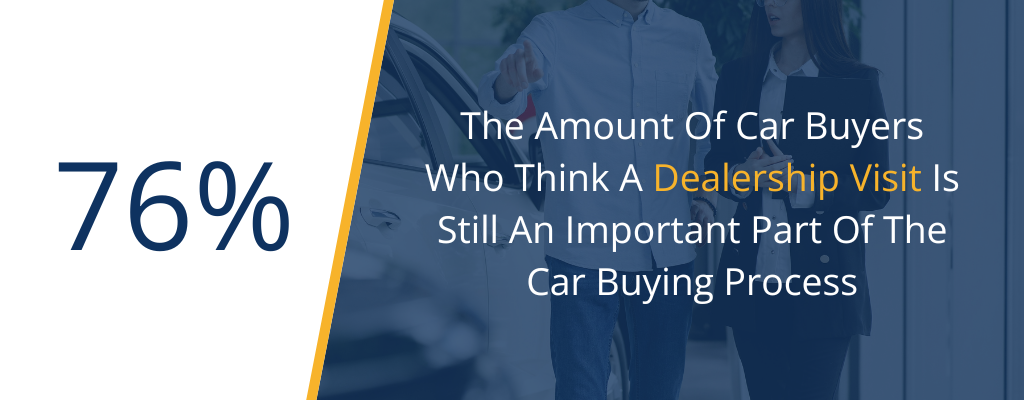
76% Of Car Buyers Still Consider The Dealership Visit An Important Part Of The Car Buying Process
Questions To Ask When Visiting A Car Dealership
What Is The Total Price Of This Car?
This sounds basic, but it can be a common pitfall for novice car buyers. Dealers will often lead with the monthly payment because it makes the deal seem more manageable. Don’t be surprised if your car salesperson frequently asks you ‘What is your monthly budget’ during the sales process.
Often, leading with a monthly figure instead of a total can disguise (or hide) extra charges such as admin fees, delivery, road tax or even hidden extras you didn’t ask for. What’s more, by using the monthly figure, you could end up paying much more in interest.
Here’s an example: Imagine you’re offered a car at £200 per month, which is a little over your budget. The dealer comes back with a much more enticing £175 per month, which, on the face of it, seems like a saving of £25, good, right?
It may seem like a good deal at first, but in most cases, all the dealer does to get your payments down is lengthen the finance term.
In our example, £200 per month for three years equates to £7200, whereas the £175 per month payment for four years totals £8400, an extra £1200 overall.
When you’re at the negotiating table, get everything out in the open and ask for an ‘on the road’ price. Whether you’re paying cash or using finance, understanding what your car is going to cost, not just today, but in the long run, is vital.
Are There Any Additional Fees Or Add-Ons I Should Know About?
Again, it’s worth pointing out that car dealerships have come a long way and the chances of any reputable car sales business tacking on unwanted extras are pretty low. That said, it pays to be vigilant and ask outright about additional fees or extras.
Dealerships offer a range of complimentary products such as Paint Protection, Gap Insurance and Tyre & Alloy Wheel Insurance, which can help keep your car in top condition and minimise your financial risk. Our advice is to consider them, but be clear on whether they’re right for you.
A good dealer will be upfront about these add-on products. A great one will explain them before you ask. But just in case they don’t, now you’re ready.
It’s worth remembering that you should never feel pressured into buying.
You should also know that you can often buy these additional products elsewhere for much less. Ultimately, it boils down to whether the convenience of buying there and then outweighs the price.
Read More: Why You Shouldn’t Take Out Gap Insurance From Your Motor Dealer
Has This Car Ever Been Used As A Demo Or Loan Vehicle?
If you’re looking at a nearly-new or “pre-registered” car, it’s fair to ask what kind of life it’s already had. Demo cars often have low mileage but could’ve had multiple drivers, not all of them careful ones.
It’s not necessarily a deal-breaker, but it’s good context. Understanding the car's past and how it’s been driven could help predict its future. Remember, loan cars and demos will never be shown the same TLC as a car owned outright.
Who Were The Previous Owners?
A spin-off question from the above, which you should definitely ask in a dealership, is ‘Who were the previous owners?’. One previous owner sounds good, but if that owner was a driving instructor or hire company, then the chances are it’s been driven poorly, with no concern over future reliability.
Can I See The Service History And MOT Details?
Especially crucial if you’re looking at a used car. A full service history gives you confidence that it’s been looked after. And if the MOT history’s a bit shaky? That’s a red flag.
Keep a keen eye on advisories too. Repeated issues could be a sign of something major. Conversely, suspiciously few (or no) advisories, particularly on older cars, could be suspect and indicate that the car has been ‘rushed through’ its MOT.
Quick Tip: You can check any UK car’s MOT history on the official GOV.UK site. It's free and takes seconds; removing the guesswork.
What Warranty Is Included And What Does It Cover?
Whilst some will be pretty comprehensive and last a while, such as Hyundai’s hefty 5-year warranty, some aren’t worth the paper they’re written on, with caveats meaning pretty much nothing is covered.
When it comes to checking your warranty, it’s worth asking:
- How long does it last?
- What parts and labour are included?
- Is it manufacturer-backed or a third-party policy?
If you’re taking out an extended warranty, it's crucial to understand the finer details too. Ask the dealership whether you need to service the car with them to keep the warranty valid.
In most cases, dealerships stipulate that you maintain and service your car with them to keep your warranty valid. This means you’re beholden to their terms and prices, which could render the warranty ineffective and expensive.
What’s The Real Interest Rate On This Finance Deal?
You might see 0% APR plastered across the windscreen, but is that the actual deal being offered to you?
Finance offers can vary depending on your credit score, deposit and contract length.
Some 0% deals come with higher car prices to offset the cost; be clear on the true interest rate (APR) and not just the headline number.
What’s The Mileage Allowance If I Choose PCP Or Lease?
With PCP or leasing, the monthly repayments are directly impacted by your estimated annual mileage. Low monthly repayments can look great, until you realise the deal includes a yearly mileage cap of 5000 miles, which you’ll eat up with just commuting alone!
All PCP and leasing agreements include an over-mileage surcharge, applied at the end of your finance term, in some cases up to 30p per mile, which can soon add up and end up costing you hundreds or thousands of pounds.
Be clear with the dealership on the mileage you’ll actually do and make sure the deal you're agreeing to includes realistic figures.
Read More: Buying on PCP? Check out the most Common PCP Mistakes (That Could Cost You Money)
Can I Take The Car For A Proper Test Drive?
If you haven’t been to a dealership for a while you’ll be shocked at how much the test drive has changed. In most cases, salespeople are more than happy to let you take as long as you need test driving the car you’re thinking of buying.
Ask the dealership if you can take the car for a proper test drive and give it a proper run on a variety of roads, including dual carriageways, motorway stretches, urban areas and a hill start or two.
If you’re feeling under pressure, ask the dealership if you can take the test drive without a salesperson present. They should be happy to accommodate this and it removes the ‘hard sell’ feeling from the process.
Is There Room For Negotiation?
Don’t ask and you won’t get. It’s not rude to ask if there’s any wiggle room, you’re just being a smart buyer. Try not to be confrontational, ask politely and you may open up a conversation around cost saving, free upgrades or bonus extras.
Remember, it’s not just about the windscreen price. If the dealership won’t budge on cost, you can negotiate on:
- Service packages: Servicing helps the dealership maintain contact with you and potentially create repeat business, something they’ll be open to throwing into your deal.
- Paint protection: Different dealerships have different paint protection packages, most of which have decent margins, meaning they can include these in your deal to make it look much more appealing.
- Free mats, fuel or upgrades: fuel and mats are a little bit ‘old school’ when it comes to added incentives, but they’re still worth an ask.
- Part exchange value: Most dealerships use a ‘trade price’ for your part exchange, but there could be some room to manoeuvre if they’re not willing to budge on the sale price of your new car.
What Happens If I Change My Mind?
In other words: what’s the return policy? Can you walk away if you spot a red flag after a few days?
With distance selling (buying online or over the phone), you usually have a 14-day cooling-off period under the Consumer Contracts Regulations, but in-person purchases don’t always come with the same flexibility.
It’s best to ask and be clear, just in case you change your mind.
Read More: What Are The Pros & Cons Of Buying A Car Online?
Can I Take A Look At The Paperwork Before Signing?
This one separates the good dealers from the pushy ones. If you feel pressured to sign on the spot, alarm bells should ring. You should always have time to read the finance agreement, warranty T&Cs, and anything else you’re putting your name to.
In fact, that’s the law. A decent dealership respects that.
Bonus Video: How To Research A Car Dealership:
Our Final Word
When it comes to car dealership visits, panic can often set in, but it’s often a fear of the unknown. Using these questions as the basis of your visit should stand you in good stead, helping get you the perfect car and separating the bad deals from the good ones.
Be clear and honest with your salesperson and they should be with you. Ultimately, you want to build a rapport with them to get the best advice and deal you can, which is in their interest too, if they’re keen on building a long-term, repeat customer.
Remember, when you’re buying a car, it’s your money you're parting with, no one else's, so be a little ‘selfish’ with your time and make sure you’re 100% on every detail of the deal. There’s no such thing as a bad question.
Don’t feel rushed and if anything feels vague or too good to be true, walk away. Keep our advice and questions in mind and you should be happy with your car and the deal.
Enjoyed Reading Or Have Any Questions?
If you’ve enjoyed reading this article why not share it with your network? You never know, it might help your friends in their car-buying journey too.
Got a question or think there’s something we’ve missed? Drop us a message on social media, we’re always happy to help.
Pin It!








